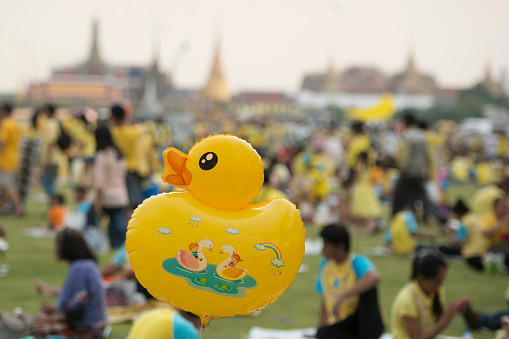
A Thai man was sentenced to two years in prison for selling calendars with satirical remarks and rubber ducks dressed in royal regalia, which the prosecution claimed were insulting to the government.
The 26-year-old Narathorn Chotmankongsin was found guilty of insulting the Thai monarch.
According to critics, about 200 people have been detained under lese majeste laws since 2020, in what they claim is a crackdown on free expression. He is one of them.
The rubber duck has served as a representative of Thai pro-democracy demonstrators.
The symbol was frequently used by protestors to call for a democratic transition, a movement that also calls for changes to the government.
For selling the calendars on the pro-democracy Facebook group Ratasadon, Narathorn was detained in December 2020.
The political parody included contentious captions and drawings of ducks dressed in imperial regalia.
According to the prosecution, the pictures and descriptions mocked and defamed King Maha Vajiralongkorn.
Narathorn was given a three-year sentence on Tuesday by the judge, which was later reduced to two years.
Human Rights Watch (HRW) said the sentence showed Thai authorities were punishing any activity they deemed insulted the monarchy, reports BBC.
"This case sends a message to all Thais, and to the rest of the world, that Thailand is moving further away from - not closer to - becoming a rights-respecting democracy," said HRW Asia director Elaine Pearson.
Rights organizations have charged the Thai government with using the royal insult legislation as a tool to suppress political dissent in recent years.
The young demonstrations that started in Thailand in July 2020 and continued into 2021 stunned traditional royalists.
For the first time, youth activists called for changes to the nation's powerful monarchy and openly mocked royal family members during their street protests.
Additionally, critics claim that the definition of an offense has been expanded.
For instance, demonstrators who wore skimpy crop tops resembling those the king occasionally wore and a protester who wore a pink dress resembling Queen Suthida faced legal action.
Another advancement in applying the law is criminalizing drawings featuring yellow ducks.
The enormous inflatable ducks were introduced to the 2020 demonstrations as a way to inject some humor and mockery into the proceedings in contrast to the harsh riot-control measures taken by the police.
Thailand is frequently criticized both for the very broad interpretations it allows of the lese majeste law, for the secrecy of the trials and the routine denial of bail, as well as the almost 100% conviction rate, and for the severity of the sentences.
However, this critique has been rejected by Prime Minister Prayuth Chan-ocha. The monarchy's continued existence is regarded as crucial to Thailand's national identity, according to the government, which continues to maintain that legislation is necessary to defend it.
Additionally, Thai authorities have been prosecuting those who have left critical remarks on social media sites more frequently under the nation's computer crime laws.
Two young activists who are presently being held on lese majeste charges began their 50th day of a hunger strike on Wednesday in opposition to the strict law.
© 2025 Latin Times. All rights reserved. Do not reproduce without permission.




